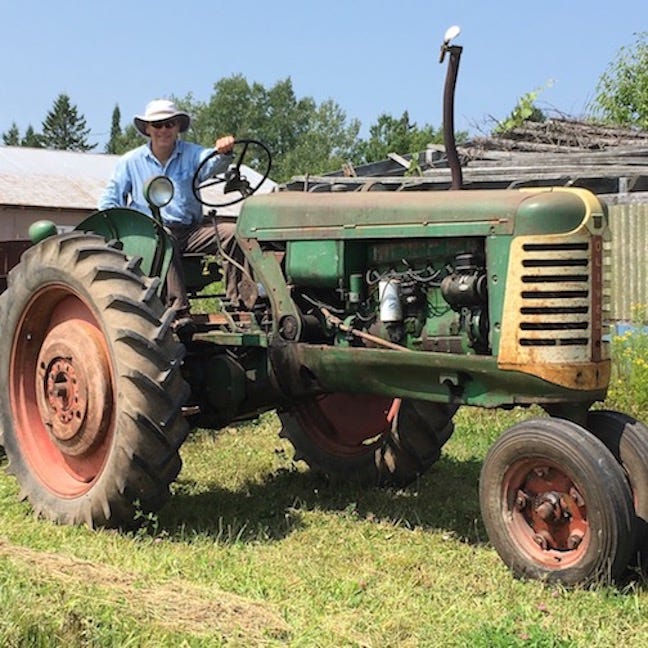Yours truly, on the tractor my Dad bought new in 1953 (an Oliver 77 for you tractor buffs). Still runs great and sips fuel.
I grew up a yeoman farmer in the Midwest. We lived on a forty acre farm, no mule, but with a tractor, a couple of horses, and a small herd of cattle. We sat outside a small manufacturing city, making Caterpillar tractors, plumbing fixtures, auto parts, tires, and, at my Dad’s job, products from corn and soybeans. This last inevitably followed from being in the middle of the best farmland in the world, and being at the company that commercialized soy products to begin with.
My family was more or less typical: small, part-time farm, full time job in a factory. We raised the classic crops of the area: corn, soybeans, hay, wheat, and cattle. Horses weren’t unusual. Some go-getters farmed considerably more, working full time both in the factory and in the field, though everybody farmed full-time when it came to getting the crops in the ground and the harvest in the barn. We had good headlights.
My Mom raised nearly all our vegetables and much of our fruit. She canned and froze huge amounts of food. My grandmother once canned a thousand quarts in a year (big family, a couple of hired hands). We raised our own beef and much of our grain. We shot pheasants, quail and rabbits. We fished the nearby river.
Graduating high school in 1974, there were still a lot of stay-at-home moms, as well as two-income families. Most people went to church, at least occasionally. Christian ethics and values prevailed.
Other than our commuter jobs in the city, we lived a classic small-town life, centered on a town of 1100 people. I went to a high school of 250, with a graduating class of 54. The town didn’t have much of an upper class. Even the town doctor farmed.
Virtually everybody I knew lived this way.
My neighbors not only worked really hard, they had a vast range of competencies. They had their job skill, maybe as a steamfitter or an electrician, but they were also farmers, mechanics, carpenters, and general fixits. They were stand-up guys, who kept their word, could be relied upon, and were always willing to help. I learned about being honest, hardworking, and independent from them.
They didn’t work this hard, in both farm and factory, because they were financially desperate. Most had good union jobs, and this was at the height of the union movement. They did this because they wanted this life, and because of the independence it gave them. It was the culture. Our culture.
We were yeoman farmers.





